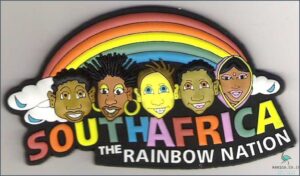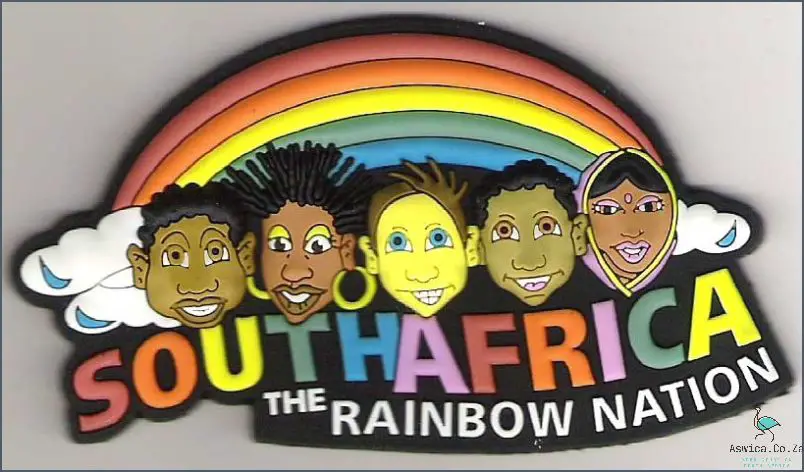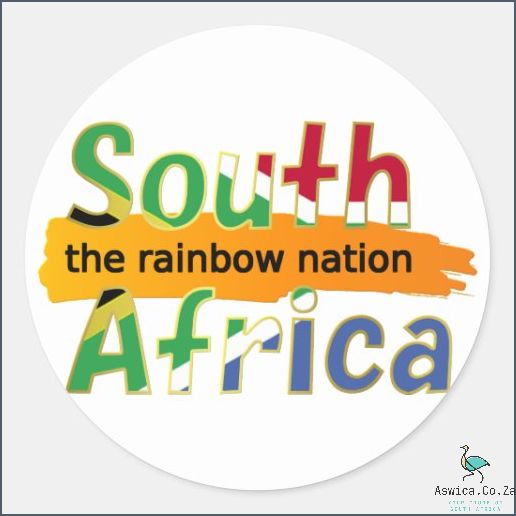
South Africa is often referred to as the Rainbow Nation due to its diverse cultural and ethnic makeup. The term was first coined by Archbishop Desmond Tutu during the country’s transition from a period of oppressive apartheid rule to democracy in the early 1990s. At the time, South Africa was a deeply divided nation with a history of racial segregation and injustice. The Rainbow Nation label was intended to emphasize the hope and potential for unity, reconciliation, and harmony among all the different races and cultures in the country. South Africa is composed of people from various backgrounds including the African majority, as well as European, Indian, and other ethnic groups. The nation is also home to a wide range of religious beliefs and traditions, including Christianity, Islam, Hinduism, and Judaism. The term Rainbow Nation has become a symbol of South Africa’s diverse culture and its commitment to democracy, equality, and inclusion.
Contents
Why Is South Africa Called The Rainbow Nation
South Africa is often referred to as the Rainbow Nation due to its diverse cultural, ethnic and religious backgrounds. South Africa is home to numerous ethnic groups and languages, all of which contribute to its unique and vibrant culture. The term "Rainbow Nation" was first coined by Archbishop Desmond Tutu in the 1990s to describe the country’s diverse population and its potential to unite the different cultural, religious and language groups. This term has since become widely accepted as a symbol of the nation’s commitment to cultural acceptance and unity. South Africa is a true example of a country that embraces diversity and celebrates its citizens’ differences.
History of South Africa and Apartheid
South Africa is known as the ‘Rainbow Nation’ due to its rich and diverse history. It is a nation that has been shaped by a long history of colonialism, apartheid, and the struggle for freedom. This history is what has resulted in the diversity that South Africa is known for today.
The history of South Africa begins with the arrival of the Dutch in 1652. This marked the start of colonial rule, with the Dutch East India Company establishing a colony in the Cape of Good Hope. The Dutch brought with them a system of racial segregation, known as apartheid, which would remain in place until the early 1990s. This system of racial segregation and discrimination was institutionalised and entrenched in South African society. It was designed to keep the white minority in power, while depriving the black majority of basic rights and freedoms.
The fight against apartheid was long and hard. It was led by the African National Congress (ANC), a political party that was founded in 1912. The ANC fought for the rights of the black majority, and for an end to apartheid. In 1948, the National Party came to power, and implemented a policy of apartheid.

Throughout the 1950s and 1960s, the ANC continued to fight against apartheid, through peaceful protests and civil disobedience. In 1960, the Sharpeville Massacre occurred, in which 69 people were killed by police during a peaceful protest. This event marked a turning point in South African history, as it became clear that the apartheid system was unsustainable.
In 1994, Nelson Mandela was elected President of South Africa, marking the end of apartheid. Mandela was an instrumental figure in the struggle against apartheid, and his election as President was a symbol of hope and progress.
Today, South Africa is known as the ‘Rainbow Nation’ due to its rich and diverse history. It is a nation that is made up of different races, cultures, and religions, and this diversity is seen in everyday life. The end of apartheid has brought a new era of hope to South Africa and its people, and has allowed the nation to move forward and heal from its dark past. South Africa today is a place of acceptance and understanding, and this is why it is known as the Rainbow Nation.
The Current Political and Social Reality in South Africa
South Africa is often referred to as the “Rainbow Nation” due to its diverse population, vibrant culture, and unique history. Since the end of apartheid in 1994, South Africa has made strides towards becoming a more cohesive, unified nation. However, the current political and social reality of the country is still largely defined by the legacy of its past.
South Africa’s population is made up of a wide range of cultures, languages, and ethnicities. This diversity is reflected in South Africa’s 11 official languages, which include Afrikaans, English, Xhosa, Zulu, and others. The nation also has a long history of racial inequality, with the majority of citizens identifying as black and minority groups identifying as white, Indian, and Coloured.
The inequality that persists in South Africa today is largely the result of its past. The apartheid system, which enforced racial segregation and political oppression of the majority black population, lasted from 1948-1994. The legacy of this system can still be seen today, as there is a significant wealth gap between white and black South Africans, as well as a lack of economic and educational opportunities for many citizens.
The current political environment of South Africa is defined by the African National Congress (ANC). The ANC is the ruling political party, and its policies and decisions have a significant effect on the country’s social and economic realities. There is also a range of smaller political parties, including the Democratic Alliance and the Economic Freedom Fighters, which represent different interests and views.

In terms of social issues, South Africa is still facing a number of challenges. These include poverty, unemployment, gender-based violence, HIV/AIDS, and a lack of access to quality education. While there has been progress made in addressing these issues, there is still a long way to go before the country can be considered a truly equal and just society.
South Africa is often called the Rainbow Nation because of its diverse population and culture. Despite the legacy of apartheid and the challenges that still exist today, there is still a great deal of hope for the future of the country. With the right reforms and policies, South Africa can continue to work towards becoming a unified, equitable nation.
The Role of Nelson Mandela in Establishing the Rainbow Nation
Nelson Mandela is often credited with establishing South Africa as the Rainbow Nation. The term “Rainbow Nation” was first used in 1994 by Archbishop Desmond Tutu, and it refers to the country’s diverse population and cultures. South Africa is a nation of many races, languages, religions, and cultures, and Nelson Mandela was instrumental in uniting these disparate groups and creating a peaceful, unified nation.
Mandela was a leader in the anti-apartheid movement, which sought to end the institutionalized racial segregation and discrimination that had been in place since 1948. He was arrested in 1962 and sentenced to life in prison, but was released in 1990. After his release, Mandela continued to advocate for a peaceful resolution to the conflict and worked to bring together formerly divided factions.
In 1994, Mandela was elected President of South Africa and immediately set about forming a government of national unity. He appointed a cabinet of ministers from across racial and political divides and initiated a number of programs aimed at healing divisions between formerly hostile groups. He also worked to ensure that all citizens had access to basic services, healthcare, and education.
The legacy of Nelson Mandela lives on in South Africa today. His efforts to bring unity to a fragmented nation have earned him the title of “Father of the Rainbow Nation”. Despite the ongoing challenges facing South Africa, Mandela’s legacy of peace and reconciliation has helped to bring the nation closer together and make it a better place for all its citizens.
Conclusion
South Africa is often referred to as the Rainbow Nation due to its diverse population. With 11 official languages and a variety of religions, ethnicities, and cultures, South Africa is a microcosm of the world. The term was first coined by Archbishop Desmond Tutu in 1994, who described the country as "a rainbow nation of different people living in harmony and peace". The phrase serves as a reminder of the need for South Africans to live together in unity and respect for one another’s differences. The Rainbow Nation is a symbol of hope for a united and peaceful future for South Africa.




